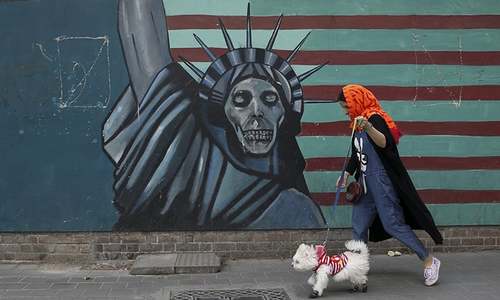Fundamentals notwithstanding, crude oil markets have begun readjusting to the overall political climate. Non-fundamentals are active — once again — impacting the overall crude scenario. A rare commonality of objectives is driving Moscow, Riyadh and Washington — at least for the time being — towards opening up the taps and cooling down the oil markets.
President Trump is pursuing several policy goals that cut against each other. He is putting pressure, publicly and privately, on the Organisation of Petroleum Exporting Countries (Opec), to increase the output and unravel the output constraint arrangement. On Wednesday he once again accused Opec of driving up oil prices.
“Oil prices are too high, Opec is at it again. Not good!” he wrote on Twitter.
Earlier on April 20 too, he did the same, scolding Opec in public. Trump wants lower gasoline prices at home and to keep the economy humming. At the same time, he wants to squeeze Iran and Venezuela with sanctions, which would inevitably lower the amount of oil on the world market. Faced with conflicting goals, he has no alternative but to put pressure on Opec to increase output. In the meantime, the US output continues to grow too.
In the pursuit, Washington has found willing allies in Moscow and Riyadh, and for different reasons. Both seem to have calculated and reached the conclusion that it is in their immediate interest to crank up production.
As The New York Times puts it, Moscow has reasons to export more oil. In recent weeks and months, Rosneft and other Russian oil companies have been lobbying Mr Putin to increase production to take advantage of higher prices and for tax reasons.
On the other hand, Riyadh cannot politically afford at this stage to stand up and say ‘no’ to the demands of the Trump administration. Riyadh has long argued against the Iran nuclear deal and pressed the United States to put more pressure on Tehran.
The Saudis are fighting Houthi rebels backed by Iran in neighbouring Yemen and have been trying to counter Iranian influence in Syria and elsewhere. After years in the wilderness, now, that they have found a willing partner in Washington, ready to go after Iran, they cannot afford to say no to Trump demands.
Already steps could be seen being taken to appease the Trump administration. Saudi Arabia reportedly pumped over 100,000 barrels per day (bpd) of crude oil more in May, with daily production reaching 10 million bpd, the Oil and Gas Journal reported, quoting Saudi officials, adding that plans are afoot to add another 100,000 bpd this month.
Saudi Arabia’s oil minister Khalid Al-Falih is also, now categorically stating that it is “inevitable” for Opec and its allies to agree to boost oil output gradually — providing the most definitive signal yet of an output increment.
“I think we’ll come to an agreement that satisfies, most importantly, the market,” Khalid Al-Falih told reporters on Thursday in Moscow when asked about the possible outcome of the upcoming meeting between the Opec and its allies in Vienna next week. “I think it will be a reasonable and moderate agreement” but nothing “outlandish,” he said.
And there are reasons for this optimism. For its own reasons, Russia too has begun opening up its taps. Media reports are underlining that the Russian oil production has now recovered to 11.1 mbpd.
This is 143,000 bpd above the country’s quota under the Opec+ production cut deal, and only about 100,000 bpd below the record-breaking production rate in November 2016, which Russia took as the basis for its cuts.
But not everyone, within Opec, seems happy with it. So far, Caracas and Tehran appear adamant that Opec doesn’t need to boost production this year, and have warned against responding to political pressure from Washington.
“The Trump administration is trying to intervene in the affairs of a sovereign organisation,” Hossein Kazempour Ardebili, a senior Iranian energy official was quoted as saying during an interview on Wednesday. Such attempts have failed in the past and “they will also fail” this time, he said.
Iraq, Opec’s second-largest producer, is also insisting that the group should resist pressure to increase oil supplies because its curbs haven’t yet achieved their purpose, with crude prices still below the desired level. Oil Minister Jabbar al-Luiebi also underlined that Baghdad “rejects unilateral decisions by some oil producers without consulting the rest of the (Opec) members.”
All this means a contentious Opec meeting on June 22. It is already shaping up to be a tough one. Yet, with Moscow and Riyadh standing together, and steps to increase the output already underway, it may not be too difficult to gauge the outcome of the Thursday Opec meeting. Not much could be done by others.
Published in Dawn, June 16th, 2018














































Dear visitor, the comments section is undergoing an overhaul and will return soon.